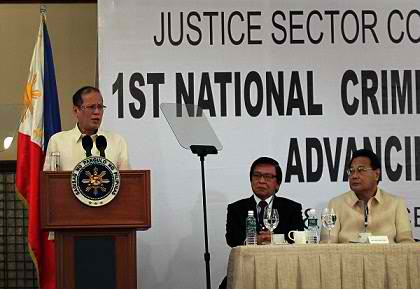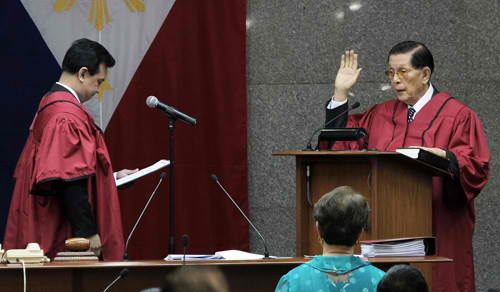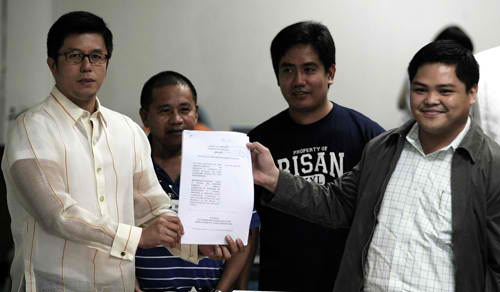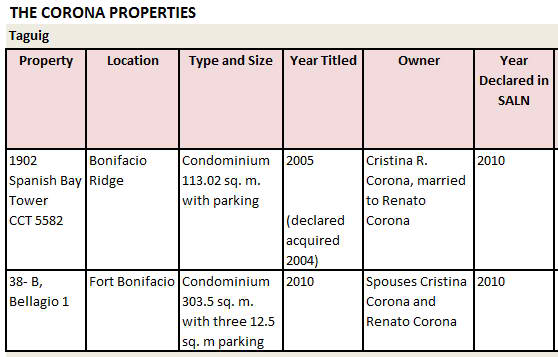FULL text of the Senate Ruling on the prosecution’s request to subpoena members of the Corona family, as read into the Jan 17 record of the Senate sitting as impeachment court.
Re Request for Subpoena to the Members of the Corona Family:
This Court addresses the request for the issuance of subpoena dated January 12, 2012, filed by the House of Representatives requesting for the issuance of subpoena ad testificandum and duces tecum directed to Chief Justice Renato C. Corona, respondent Chief Justice, his wife, Cristina R. Corona; their children, Carla R. Corona-Castillo and Francisco R. Corono and their children’s spouses, Constantino T. Castillo Ill and Charina K. Corona to require them to appear and testify before this Court during the hearing on January 16, 2012 at 2:00 p.m., or on such other date and time as may be specified by the court and to bring with them the documents specified. This court resolves to deny the request.
First, the primary purpose of the request for the issuance of subpoena to respondent Chief Justice is to require him to testify for the prosecution in relation to the Articles of Impeachment filed against him. This cannot be done without running afoul of respondent’s constitutional right against self-incrimination. Section 17, Article Ill of the 1987 Constitution provides:
“No person shall be compelled to be a witness against himself.”
The justification for the guarantee was stated by the Supreme Court by the avuncular case of U.S. vs. Navarro.’ The Supreme Court ruled:
“It was established on the grounds of public policy and humanity: Of policy, because if the party were required to testify, it would place the witness under the strongest temptation to commit perjury; and of humanity, because it would prevent the extorting of confessions by duress.”
In similar vein, Supreme Court in US. vs. Tan Teng, categorically opined that “the main purpose of the provision … is to prohibit compulsory oral examination of prisoners before the trial, or upon trial, for the purpose of extorting unwilling confessions or declarations implicating them in the commission of a crime.”
This constitutional provision applies to civil, criminal or administrative cases. This is not without jurisprudential justification. In Cabal vs. Capunan, Jr., in a proceeding for forfeiture of property under Anti-Graft Law, the respondent therein was accorded the right to refuse to take the witness stand to testify. In Pascual vs. Board of Medical Examiners, the respondent therein in an administrative investigation for immorality and malpractice was accorded a similar right since the revocation of his license as a medical practitioner could even be more serious deprivation than forfeiture of property.
Neither may the respondent Chief Justice be compelled by subpoena to produce documents stated in the Request. This is because the prohibition is also applied to the compulsion for the production of documents, papers and chattels that may be used as evidence against the witness.
There is no reason for this Court not to apply the above jurisprudential doctrines.
It should be stressed that, if convicted, respondent Chief Justice would suffer the penalty of (a) removal from his position as Chief Justice before the expiration of his term and (b) suffer perpetual disqualification from holding any government position. Therefore, it would violate the constitutional right of respondent Chief Justice against self-incrimination if be would be compelled to appear and testify against himself by virtue of a subpoena directed to him by the Court upon the request of the prosecution.
Second, it must also be emphasized that even under the Rules of Procedure on Impeachment Trials of this Court, the person impeached is not required to attend the proceedings. The only consequence of his failure to appear is that the proceedings shall continue in his absence. Thus, the Senate Impeachment Rules provides, to wit:
VII. Upon the presentation of articles of impeachment and the organization of the Senate as hereinbefore provided, a writ of summons shall be issued to the person impeached, reciting or incorporating said articles, and notifying him/her to appear before the Senate upon a day and at a place to be fixed by the Senate and named in such writ, and to file his/her Answer to said articles of impeachment within a non-extendible period of ten (10) days from receipt thereof; to which the prosecutors may Reply within a non-extendible period of five (5)days therefrom; and to stand to and abide by the orders and judgments of the Senate. Such writ shall be served by such officer or person named in the order thereof, not later than three (3) days prior to the day fixed for such appearance of the person impeached, either by the delivery of an attested copy thereof to the person impeached, or if personal service cannot be done, service of the writ may be made by leaving a copy with a person of sufficient age and discretion at his/ her last known address or at his/her office or place of business; and if the service of such writ shall fail the proceedings shall not thereby abate, but further service may be made in such manner as the Senate shall direct. If the person impeached, after service, shall fail to appear, either in person or by counsel, on the day so fixed or, appearing, shall fail to file his answer to such articles of impeachment, the trial shall proceed nevertheless as upon a plea of not guilty. If a plea of guilty shall be entered, judgment may be entered thereon without further proceedings. (Emphasis supplied)
Anent the request for the issuance of subpoenae duces tecum and ad testficandum to the respondent Chief Justice’s wife, Cristina R. Corona, the Court also denies the same.
The last sentence of Section VI of the Impeachment Rules state that:
“The provisions of the Rules of the Senate and the revised Rules of Court shall apply suppletorily whenever applicable.”
Thus, the Court is of the considered view that Section 22, Rule 130 of the Revised Rules of Court squarely applies. It provides:
“Sec. 22. Disqualification by reason of marriage. – During their marriage, neither the husband nor the wife may testify for or against the other without the consent of the affected spouse, except in a civil case by one against the other, or in a criminal case for a crime committed by one against the other or the latter’s direct descendants or ascendants.”
The reasons given for the rule are: 1) There is identity of interests between husband and wife; 2) If one were to testify for or against the other, there is consequent danger of perjury;
3) The policy of the law is to guard the security and confidences of private life, even at the risk of an occasional failure of justice, and to prevent domestic disunion and unhappiness; and
4) Where there is want of domestic tranquility, there is danger of punishing one spouse through the hostile testimony of the other.
For this rule to apply, the following requisites must be complied with: 1) that the spouse for or against whom the testimony of the other is offered is a party to the case; 2) that the spouses are legally married; 3) that the testimony is offered during the existence of the marriage; 4) that the case is not one against the other.
This Court is of the view that the foregoing requirements for the application of marital disqualification rule under Section 22, Rule 130 of the Rules of Court are present in the instance case. For one, it is an admitted fact that Mrs. Cristina Corona is the wife of Respondent Chief Justice and that she is being sought to testify during the existence of her marriage with the respondent Chief Justice. Secondly, the request for the issuance of subpoena to Mrs. Corona is for her to testify in favor of the Prosecution. Thirdly, this impeachment case is definitely not a case of Spouses Corona against each other.
Thus, not falling within the recognized exception of the marital disqualification rule, this Court finds the request for subpoenae duces tecum and ad testificandum for Mrs. Cristina Corona without legal justification.
As far as the request for the issuance of subpoena to respondent’s Chief Justice’s children, Carla R. Corona-Castillo and Francis R. Corona are concerned, it should also be stated that these are also disallowed.
Section 25, Rule 130 of the Revised Rules of Court provides that:
Sec. 25. Parental and filial privilege. – No person may be compelled to testify against his parents, other direct ascendants, children or other direct descendants.
The above is an adaptation from a similar provision in Article 315 of the Civil Code that applies only in criminal cases adopted in Article 215 of the Family Code. But those who revised the Rules of Court chose to extend the prohibition to all kinds of actions, whether civil, criminal, or administrative, filed against parents and other direct ascendants or descendants.
The disqualification is intended to preserve family solidarity and to prevent a common child to be used by a parent against the other on criminal litigations between them. The solidarity and unity of the family is shattered when a child takes sides in parental feuds. Neutrality is still the best part of prudence on the part of descendants except only in extreme cases. Thus, on account of the foregoing reasoning, this Court cannot issue subpoena to respondent Chief Justice’s children, Carla R. Corona-Castillo and Francis R. Corona.
With respect to the request for subpoenae duces tecum and ad testificandum to Mr. Constantino T. Castillo III and Charina R. Corona, this Court adopts the doctrine of necessary implication. The doctrine of necessary implication means that what is implied in the statute is as much as part thereof as that is expressed. This Court believes that, by necessary implication, children-in-law are covered by the prohibition to testify on account of parental and filial privilege. The ratiocination of this Court is bolstered taking into account the primordial purpose of parental and filial privilege which is the solidarity and unity of the family.
WHEREFORE, in view of all the foregoing, the Request for the Issuance of Subpoenae dated January 12, 2012 is DENIED for LACK OF MERIT.



